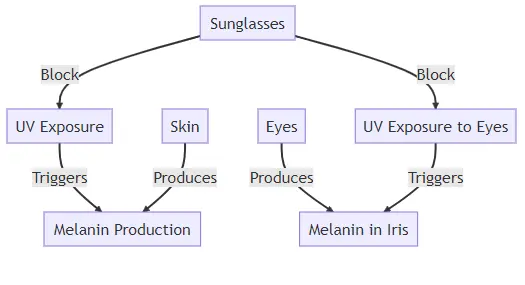Melanin is a pigment that is responsible for the color of our skin, hair, and eyes. It also plays a crucial role in protecting our skin from the harmful effects of ultraviolet (UV) radiation from the sun. But what role do sunglasses play in this process? Do they prevent melanin production? This article will delve into the science behind melanin production and find if sunglasses prevent Melanin production.
Understanding Melanin Production

What is Melanin?
Melanin is a natural pigment produced by cells called melanocytes in the basal layer of the skin. There are two types of melanin: eumelanin, which is brown or black, and pheomelanin, which is yellow or red. The type and amount of melanin your body produces determine the color of your skin, hair, and eyes.
How is Melanin Produced?
Melanin production is a complex process that involves several steps. It begins when the skin is exposed to UV radiation from the sun. This exposure triggers the melanocytes to produce melanin in a process called melanogenesis. The melanin is then transferred to the keratinocytes, the main cells of the skin, where it forms a protective shield over the nucleus of the cell, protecting the DNA from UV damage.
The Role of Sunglasses in Protecting Against UV Radiation

How Do Sunglasses Work?
Sunglasses are designed to protect our eyes from the harmful effects of UV radiation. They do this by absorbing or reflecting the UV rays before they can reach our eyes. The level of protection provided by sunglasses is determined by the UV protection rating. Sunglasses with a UV400 rating block 99 to 100 percent of UV rays.
Do Sunglasses Prevent Melanin Production?
Sunglasses protect the eyes from UV radiation, but they do not directly prevent melanin production. Melanin production is a response to UV exposure, so if the skin is exposed to UV rays, melanin production will occur regardless of whether you are wearing sunglasses. However, by blocking UV rays, sunglasses reduce the need for the body to produce extra melanin to protect the skin.
The Impact of Sunglasses on Melanin Production in the Eyes
While sunglasses do not prevent melanin production in the skin, they can impact melanin production in the eyes. The iris, the colored part of the eye, contains melanin. When the eyes are exposed to sunlight, the body can respond by producing more melanin in the iris, leading to a darkening of the eye color. By wearing sunglasses, you can reduce this exposure and potentially prevent this change in eye color.
Conclusion: The Importance of Sun Protection
While sunglasses do not prevent melanin production, they play a crucial role in protecting our eyes from the harmful effects of UV radiation. They reduce the need for our bodies to produce extra melanin as a form of protection against UV damage. Therefore, wearing sunglasses, along with other forms of sun protection such as sunscreen and protective clothing, is essential for maintaining our skin and eye health.
In conclusion, while sunglasses do not directly prevent melanin production, they play a vital role in protecting our skin and eyes from the harmful effects of UV radiation. By reducing UV exposure, they lessen the need for our bodies to produce extra melanin, helping to maintain our skin and eye health. So, next time you step out into the sun, don’t forget your sunglasses!



Recent Comments